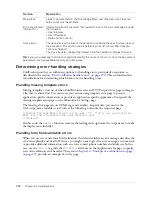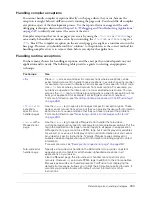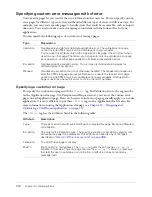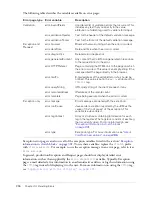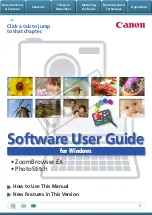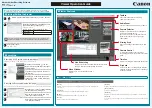
Optimizing ColdFusion applications
281
Optimizing database use
Two important ColdFusion MX tools for optimizing your use of databases are the
cfstoredproc
tag and the
cfquery
tag
cachedWithin
attribute.
Note:
Poor database design and incorrect or inefficient use of the database are among the most
common causes of inefficient applications. Consider the different methods that are available for using
databases and information from databases when you design your application. For example, if you
need to average the price of a number of products from an SQL query, it is more efficient to use SQL
to get the average than to use a loop in ColdFusion.
Using stored procedures
The
cfstoredproc
tag lets ColdFusion MX use stored procedures in your database management
system. A stored procedure is a sequence of SQL statements that is assigned a name, compiled,
and stored in the database system. Stored procedures can encapsulate programming logic in SQL
statements, and database systems are optimized to execute stored procedures efficiently. As a
result, stored procedures are faster than
cfquery
tags.
You use the
cfprocparam
tag to send parameters to the stored procedure, and the
cfproresult
tag to get the record sets that the stored procedure returns.
The following example executes a Sybase stored procedure that returns three result sets, two of
which the example uses. The stored procedure returns the status code and one output parameter,
which the example displays.
<!--- cfstoredproc tag --->
<cfstoredproc procedure = "foo_proc" dataSource = "MY_SYBASE_TEST"
username = "sa" password = "" returnCode = "Yes">
<!--- cfprocresult tags --->
<cfprocresult name = RS1>
<cfprocresult name = RS3 resultSet = 3>
<!--- cfprocparam tags --->
<cfprocparam type = "IN"
CFSQLType = CF_SQL_INTEGER
value = "1" dbVarName = @param1>
<cflock scope="Application"
type="Exclusive"
timeout=30>
<cfset Application.productCache =
productcache>
</cflock>
Inside an Exclusive
cflock
tag, saves the contents of
the local variable
ProductCache
in the Application
scope variable Application.productCache.
</cfif>
Ends the code that executes only if the
Application.productCache variable does not exist.
<cflock scope="application" timeout="20"
type="readonly">
<cfoutput>#Application.ProductCache#<
/cfoutput>
</cflock>
Inside a
cflock
tag, displays the contents of the
Application.productCache variable.
Code
Description
Summary of Contents for ColdFusion MX
Page 1: ...Developing ColdFusion MX Applications...
Page 22: ...22 Contents...
Page 38: ......
Page 52: ...52 Chapter 2 Elements of CFML...
Page 162: ......
Page 218: ...218 Chapter 10 Writing and Calling User Defined Functions...
Page 250: ...250 Chapter 11 Building and Using ColdFusion Components...
Page 264: ...264 Chapter 12 Building Custom CFXAPI Tags...
Page 266: ......
Page 314: ...314 Chapter 14 Handling Errors...
Page 344: ...344 Chapter 15 Using Persistent Data and Locking...
Page 349: ...About user security 349...
Page 357: ...Security scenarios 357...
Page 370: ...370 Chapter 16 Securing Applications...
Page 388: ...388 Chapter 17 Developing Globalized Applications...
Page 408: ...408 Chapter 18 Debugging and Troubleshooting Applications...
Page 410: ......
Page 426: ...426 Chapter 19 Introduction to Databases and SQL...
Page 476: ...476 Chapter 22 Using Query of Queries...
Page 534: ...534 Chapter 24 Building a Search Interface...
Page 556: ...556 Chapter 25 Using Verity Search Expressions...
Page 558: ......
Page 582: ...582 Chapter 26 Retrieving and Formatting Data...
Page 668: ......
Page 734: ...734 Chapter 32 Using Web Services...
Page 760: ...760 Chapter 33 Integrating J2EE and Java Elements in CFML Applications...
Page 786: ...786 Chapter 34 Integrating COM and CORBA Objects in CFML Applications...
Page 788: ......


























